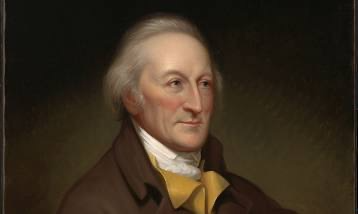George Clymer (1739-1813), a native Pennsylvanian, was a founding member of the Society and like several other founding members, he was a figure in many of the critical events in the establishment of our country. Orphaned at an early age, he was brought up by his maternal aunt Hannah and her husband, William Coleman, who was a Quaker merchant. Clymer took on his uncle’s trade and inherited the profitable business. He married Elizabeth Meredith whose brother became Treasurer of the United States in 1789 and with whom he merged his merchant firm. George and Meredith Clymer had nine children; their son Henry married into the Willing family, several of whom were mayors of Philadelphia.
Given his background in trade and economics, he found the British restrictions cumbersome and was an early participant in the move to separate from England, joining in demonstrations against the Tea Act and the Stamp Act. Elected to the Continental Congress, Clymer served as one of two Treasurers and as a member of commissions that inspected military field operations. When Congress fled Philadelphia, Clymer remained in the city with George Walton and Robert Morris. Later as a Pennsylvania delegate to the Constitutional Convention, he sat on a committee to draft a Slave Trade Compromise that eventually allowed a tariff but failed to have little impact on the trade itself.
When the first US Congress convened in 1789, Clymer represented the state of Pennsylvania. Later he served on a presidential commission to negotiate a treaty with the Cherokee and Creek Indians in Georgia.
Clymer’s uncle, William Coleman, was a founder and trustee of the University of Pennsylvania and Clymer became a trustee himself in 1779, serving until his death in 1812 and as Treasurer of the Board from 1779-1780. Clymer became a member of the American Philosophical Society in 1759, a member of the Philadelphia Committee of Safety in 1773. He became a founding member of the Philadelphia Society for Promoting Agriculture in 1785 and Vice President of this Society in 1805. He was also the first president of the Philadelphia Bank, a sponsor of the Pennsylvania Academy of Fine Arts and a signer of both the Declaration of Independence and the U.S. Constitution.

